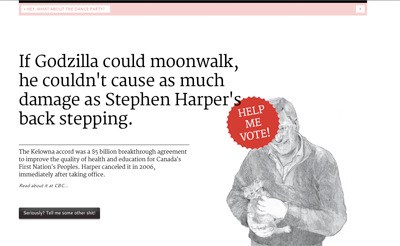It was touted as Canadas first social media election, but the nations 41st parliament seems to be the result of old-fashioned door-knocking and electioneering rather than tweeting and blogging, says one political expert.
It looks like social media is just what it is: social media. It doesnt translate into votes, says SFU political science professor Marjorie Griffin Cohen.
New to this election campaign were the many online campaigns, from the satirical Shit Harper Did to the strategic Project Democracy, which set the Internet atwitter with citizen-led messaging aimed at increasing voter turnout, particularly among youth, and often with a left-leaning bent.
However reports from Elections Canada from the morning of May 3 indicate the effort likely made a marginal difference at best with a solid Conservative majority and voter turnout inching up only two points to 61.4 per cent from the 2008 historic low of 59.1 per cent.
Griffin Cohen says while the citizen-led online initiatives were effective at capturing attention with creative and often comical messaging, their failure to translate into votes lies with lack of involvement from political parties. The parties didnt use it and that may have been the problem, she says. Unlike the Obama administration where his party really used it, they didnt know how to do it here and so I think it didnt translate in the same way as it did in the U.S.
Rather, Griffin Cohen says the deciding factors in many hard-won ridings came down to old-school tactics such as house calls and driving supporters to the polls. Even the New Democrat Partys surprising orange surge in Quebec seems to be the fruit of an older electorate, Griffin Cohen noted. We may discover that there were pockets of places where [social media] had a significant impact... but at least it didnt translate for the young vote in the way that we all expected it to.
Steve Anderson, the open Internet advocate behind OpenMedia.ca agrees the social media campaigns suffered from lack of interest and involvement from political parties. The whole get-out-the-vote movement didnt have a lot to grab onto. The question that was left out was why am I voting? Whos giving me something to vote for? he says, noting the Jack Laytons NDP did seem to tap into the swell in citizen engagement to secure official Opposition status, but only very late in the campaign.
I think citizens grabbed on to social media and YouTube and vote mobs and that stuff about as much as you could ask them to, but I think the politics of the country havent really caught up with the citizens, Anderson says.
But even a small bump in voter turnout is an encouraging trend, he adds. I think voter turnout was set to drop and use of social media is a big part of the reason the trend is moving in the right direction.
Sean Devlin, the Vancouver-based comedian behind the anti-Stephen Harper site ShitHarperDid.com is also putting a positive spin on what he admitted was a disappointing election result.
Our goal was very simple, we wanted to make people laugh and we wanted those people to be people who didnt normally pay attention to politics. We have no doubt that we succeeded in that, he says.
With more than 4 million hits during the election campaign, ShitHarperDid.com and its accompanying satirical YouTube videos caught the eye of mainstream media and took off on Facebook and Twitter. Devlin says he hopes to channel the sites momentum into a new push for proportional representation in Canada, by pointing out Harpers 167 seat majority was won with only 40 per cent of the popular vote.
Four out of 10. That isnt enough dentists to sell toothpaste, so why is it enough votes to rule our country? he says. Devlins new Facebook page: 4 in 10, not enough dentists to sell toothpaste so why is it enough votes? had more than 600 likes in its first hour.
But SFU professor Griffin Cohen cautions that with a Conservative majority handing Stephen Harper relatively unchecked power, a shift to proportional representation, online or in the real world, is likely to remain a virtual reality. We might see more calls for it, but its not going to happen under Harpers rule.



